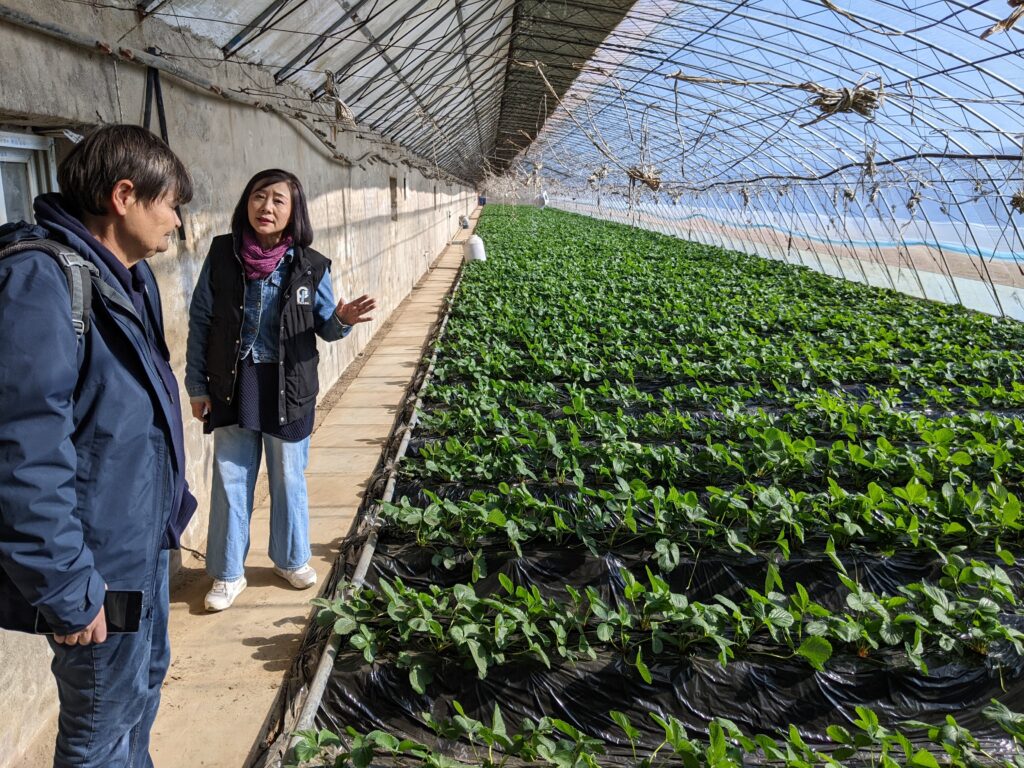China's organic farm sector is booming
China’s organic farming sector has seen remarkable growth over the past two decades. With 2.2 million hectares, China is now amongst the ten countries with the largest area of organic farmland and the fourth largest market for organic products worldwide [1]. Key drivers behind this trend have been the growing health and environmental issues linked to the heavy use of chemical fertilizers and pesticides as policymakers have sought to modernize the farming sector, increase agricultural productivity, and boost yields. Endemic food safety scandals – from food adulteration to fake foods – have further undermined trust in the food industry and regulatory authorities [2]. In response, consumers, particularly from the urban middle class, have turned to small-scale, organic farmers, farmers’ markets, and local food networks for the provision of healthy and safe foods.
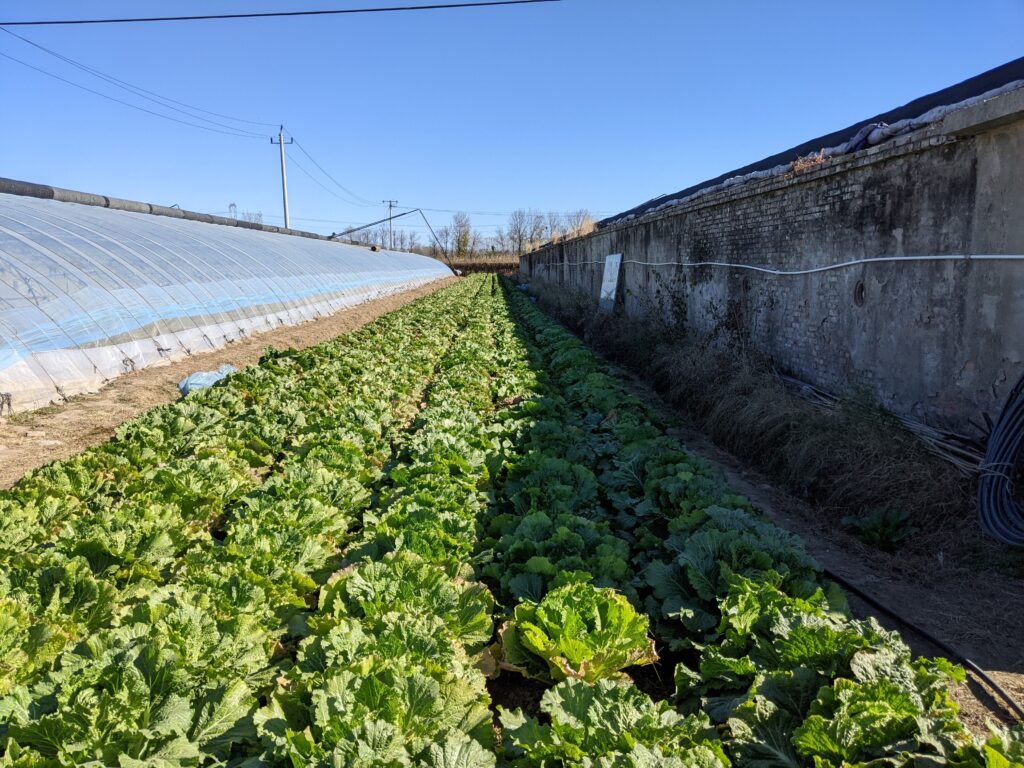
To gain a deeper understanding of the organic farming sector in China as well as the opportunities and challenges it faces, in early November, the DCZ team visited Pingren Farm (平人农场) – an organic producer located at the outskirts of Beijing in Changping district, Maizhuang village. Less than an hour’s drive from the bustling city center, the farm has been producing fresh, organic produce since 2010. On 50 mu of farmland (3.3 ha) contracted from the local village government, the farm grows over 100 different kinds of vegetables and fruits. Neat rows of winter cabbage and onions alternate with greenhouses, offering protection to some of the more delicate varieties and prolonging the growing period.
Developing organic farming practices
Good soil cultivation practices are crucial to organic production, says farm manager Kelly Zhang as she shows the DCZ team around the farm’s composting site. Plant residues from the farm are combined with animal manure to be turned into compost, replenishing soil fertility and improving soil health. Some of the manure comes from Pingren Farm’s second farming operation – an organic sheep farm located in Shanxi province, where the animals are fed with organic feed and receive no antibiotics. To produce the highest-quality humus possible, the farm team have been working closely with scientists from China Agricultural University, seeking to continuously improve the composting process and humus quality.
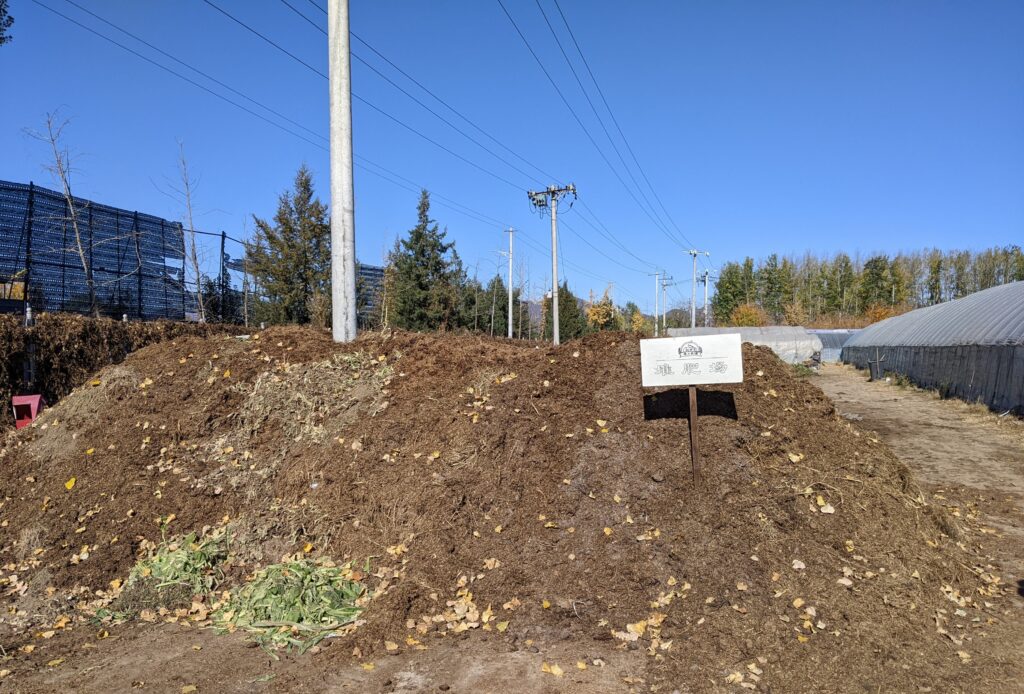
With no agrichemicals allowed, biological pest control methods play an important role, explains Xiao Mei, a China Agricultural University graduate, who has been working at Pingren Farm for five years. Simple practices such as netting provide an eco-friendly, cost-effective way of protecting crops, while “bug-eats-bug” strategies rely on beneficial insects and birds to help control pests on the farm’s plants. Several areas around the farm such as an herb garden and some “wild”, non-farmed patches help create the biodiversity that is needed for insects to maintain a natural balance.
Greenhouses are also an important part of the farm’s pest control strategy, affording the farm team pest control options that are not available for field crops, such as physical exclusion. Unlike the high-tech controlled environments dominating vertical farming and closed-loop systems, these are simple hoop houses covered by plastic sheeting and sometimes reinforced by a brick wall, shielding the structures from the cold northern winds. Absorbing sunlight during the day and being covered by thick protection layers at night, these structures are able to keep temperatures above the freezing point for most of the year without any additional heating, we learn from our hosts. This allows Pingren Farm to grow high-value produce such as strawberries as late as December.
More support needed
Over the past two decades, the Chinese government has developed a sound regulatory framework for organic agriculture, including the creation of organic labels and certification institutions. Since 2015, official policy goals to reduce the use of agrichemicals have further strengthened the organic sector [3]. Yet, many small organic growers struggle to make ends meet. “There is really no money in organic agriculture”, farm manager Kelly Zhang says. Growers are often driven by a sense of idealism rather than profits. High production costs are the biggest problem. While organic farms can save on agrochemical inputs, labor costs are high. At Pingren Farm, a labor-force of more than 30 people is needed for farming, management, and infrastructure maintenance. Developing locally adjusted, organic farming practices such as making the right compost for the available types of soil takes time and money. Despite the environmental and ecosystem services provided by organic growers such as Pingren Farm, there are neither subsidy nor insurance schemes in place in the Beijing region, we learn from our hosts.
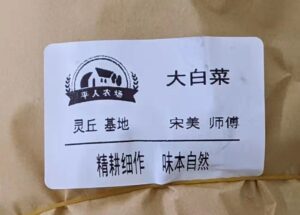
Pingren Farm’s own label indicating location and method of production
Organic certification is another challenge. In theory, organic labels could help producers tap into a higher price segments, but with the Chinese system requiring certification for every single product rather than the whole farm, costs may outweigh benefits, given the diversity of produce grown by many small-scale organic farmers. With over 100 different types of vegetables and fruits, Pingren Farm has not yet applied for any organic label, we hear from Kelly Zhang, but the farm management is currently considering organic certification for single crops, such as the farm’s strawberry production.
Another aspect is China’s land tenure system, which does not always work in favor of small-scale, organic farmers. Like conventional farmers, organic growers do not own their land but contract it from local governments. Since 2010, Pingren Farm has been operating on a 20-year lease. Lack of ownership has made it harder to channel investments into the farm and tap into higher value-added activities, we hear from the farm management. Moreover, strict land use regulations requiring farmland to be used exclusively for agricultural purposes run counter to the more holistic farming principles in place at the farm. For example, last year, regulators demanded that areas of the farm dedicated to landscaping and biodiversity be re-purposed for direct agricultural production. These regulations are part of China’s efforts to ensure a high degree of food self-sufficiency despite its limited land resources, but they might be detrimental to organic farming practices. Likewise, opening a restaurant on the farm premises to generate additional income is not permitted under the current land regulations.
New forms of retailing
Direct linkages with consumers are crucial for organic growers such as Pingren Farm. Since the farm produce is not officially certified as organic, Pingren Farm relies on personal relationships of trust with its consumers. As part of the “alternative food networks” (AFN) movement emerging in metropolitan areas like Beijing [4], the farm promotes its produce at local farmers’ markets or via food box schemes and supplies a small number of vegetarian restaurants in downtown Beijing as well the network of China Agricultural University. Once consumers know about the farm, they can easily order daily, fresh produce to be delivered to their homes via the farm’s own WeChat store. In addition, the rental of tiny gardening plots where families from Beijing grow their own vegetables and spend time at Pingren Farm further strengthens trust between growers and urban consumers in search of healthy, locally produced “foods from somewhere” [5].
Despite growing consumer demand for sustainably produced, local food and the development of a regulatory framework for the organic sector, small-scale, organic growers face many challenges. Their production and retail practices based on the development of local knowledge and direct relationships with consumers do not fit the “modern agriculture” paradigm pursued by China’s policy makers. At the same time, organic farms do not receive compensation for the many indirect services they provide to communities, such as strengthening biodiversity or improving soil health. More support mechanisms tailored to the needs of small-scale, organic farmers are necessary to help the sector flourish in the future.
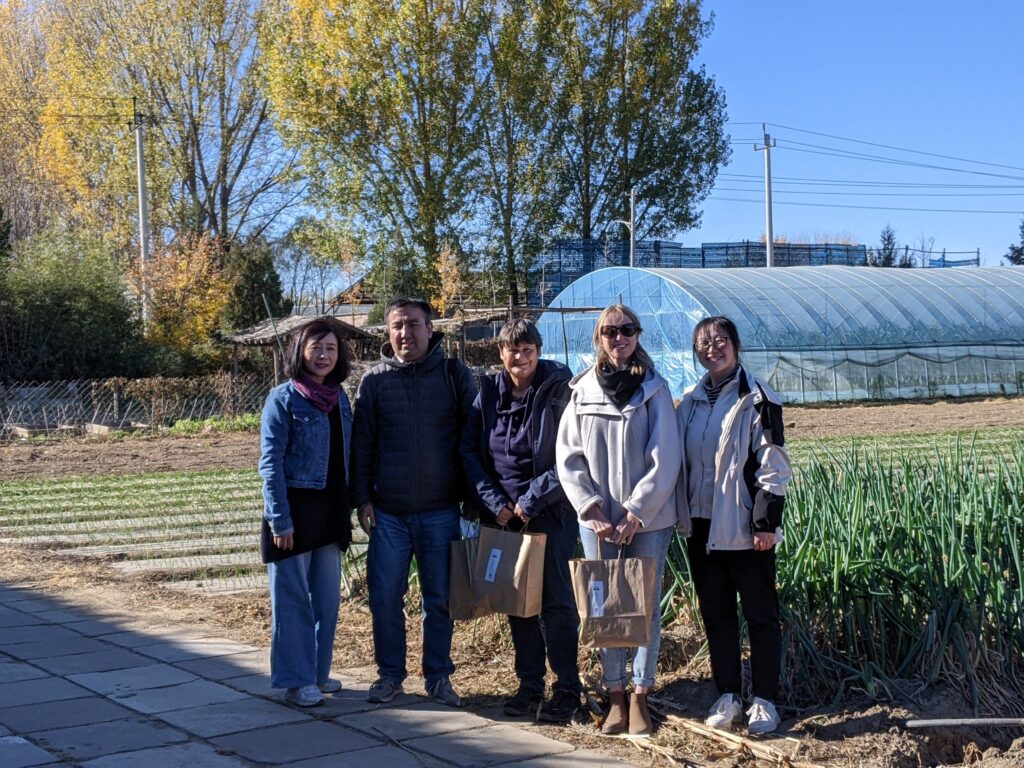
References
[1] Sternfeld, E. (2021). China’s organic agriculture and food sector. In: DCZ Newsletter – Sino-German Agricultural and Food Update, No. 14 (March – May 2021), pp. 3-12, available online at https://www.dcz-china.org/2021/05/31/dcz-newsletter-no-14/.
[2] Yan, Yunxiang (2012). Food safety and social risk in contemporary China. In: The Journal of Asian Studies, Vol. 71, No. 3, pp. 705-729.
[3] Sternfeld, E. (2021). Daten und Fakten zur ökologischen Landwirtschaft Chinas. In: ÖKOmenischer Gärtnerrundbrief, No. 1, pp. 6-7, available online at https://www.dcz-china.org/2021/03/12/in-the-press-figures-and-facts-on-organic-ag-in-china/.
[4] Fröhlich, Franziska (2017). Wie kommt das Essen auf meinen Tisch ? Subjekte im Diskurs chinesischer ökologischer Bauernmärkte und städtischer Kleingärten. In: Alpermann, Björn et al. (eds.). Aspekte des sozialen Wandels in China, Springer VS: Wiesbaden, pp. 299-324.
[5] Campbell, Hugh (2009). Breaking new ground in food regime theory: corporate environmentalism, ecological feedbacks and the ‘food from somewhere’ regime? In: Agriculture and Human Values, No. 26, pp. 309–319.




